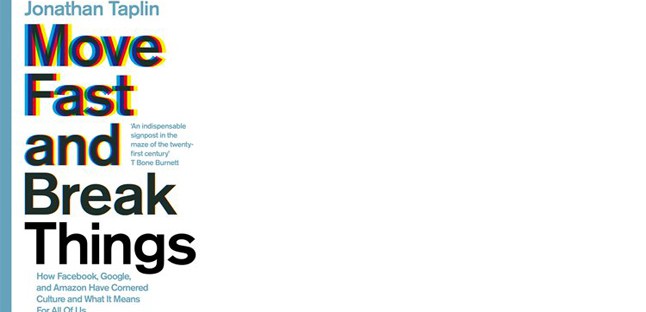Latest posts
A masterclass in creating value
What’s going on at parkrun?
Virtue-signalling all the way to the bank
Bud Light: brand purpose or virtue-signalling?
The Coddling of the American Mind, by Greg Lukianoff and Jonathan Haidt
Belonging, by Owen Eastwood
Such a simple thing
The Long Win, and The Scout Mindset
The Cult of We by Eliot Brown and Maureen Farrell
Coffee and covid modelling
By theme
Marketing strategy
Insight & metrics
Innovation & inspiration
Brand & positioning
Marketing communications
Business purpose
Leadership
By industry sector
Financial services
Retail
FMCG
Technology & start-ups
Consumer services
Business to business
Other sectors
By type
Books
Comment
Quotes
Thought leadership
It’s easy to project altruistic motives onto young, Gap-clad, seemingly naïve, computer-gaming geeks who appear to care more about coding than about money. This book makes a strong case that it’s the rest of us – including governments – who are the naïve ones. Taplin spent his life in music and film, and started an early legal content-streaming business. He uses personal stories to show how the internet’s biggest jockeys Google (with YouTube) Facebook and Amazon have built their profits from the pockets and creativity of others.
His central thesis is that “don’t be evil” is a clever smokescreen. Google didn’t ask for permission to copy the entire contents of the world wide web into their servers and then index it. Nor to digitise all books, most in copyright, nor to photograph your house and your neighbour’s, and everyone’s.
Think instead of Ayn Rand libertarianism, coupled with, in some cases, deliberate exploitation of other people’s intellectual property. It’s summed up by this brief exchange in Rand’s vast novel, “Atlas Shrugged”:
“My dear fellow, who will let you?”
“That’s not the point. The point is, who will stop me?”
Taplin covers the origins of Facebook, Amazon and YouTube, and the book is worth reading for that alone. But Jonathan Taplin has stories of his own to tell. He was tour manager for Bob Dylan and The Band, produced Hollywood movies, and had a spell on Wall St. He was there when Dylan went electric. He knew the “tune in drop out” guys. So, he traces the social and cultural origins of the internet, way beyond Tim Berners Lee at CERN, showing the critical role of Xerox’s Palo Alto Research Center (PARC), and then its partnership with Steve Jobs and a nascent Apple Computer before that famous Super Bowl ad of 1984.
The cast of characters is spectacular, from the earliest hackers to the secretive billionaire Koch brothers. There’s Alexis Ohanian, founder of Reddit, and now husband of Serena Williams, making an idiot of himself. A few criminals, including Dread Pirate Roberts the founder of Silk Road – real name Ross Ulbricht, currently serving life without parole in a US high security prison. Larger-than-life Kim dot com. Sean Parker, convicted hacker, founder of Napster, with his $10m Lord of the Rings-themed wedding. And Peter Thiel, PayPal co-founder, who says proudly “Of the six people who started PayPal four had built bombs in high school.” Not surprising then to hear him say, “I no longer believe that freedom and democracy are compatible.”
The other side of the story is that US regulation and anti-trust legislation doesn’t work. Designed on principles established by Hamilton (he of the hit musical, so clearly somewhat pre-internet), it’s intended to ensure competition, but focuses on consumer prices as the proof. We all feel queasy about the value of the data we’re giving away to Facebook and Google. But if the product appears to be free to the user, anti-trust legislation doesn’t seem to apply. Taplin sums it up like this: “Monopoly, control of our data, and corporate lobbying are at the heart of this story”.
There is hope. Apple is a dissenter from the libertarian creed. That’s why they support ad blockers to stop surveillance marketing, and fought so hard against being forced to unlock the San Bernardino bomber’s phone. On the sunnier side, there are some lovely examples of co-operatives, from the Sunkist farmers in the 1890s, through to Magnum photography, to local ISPs in Chattanooga providing a better service than the national players and regenerating their city. Incidentally, Sunkist was the earliest registered brand name, in 1908. It’s still going. Maybe that is some comfort.
Latest posts
A masterclass in creating value
What’s going on at parkrun?
Virtue-signalling all the way to the bank
Bud Light: brand purpose or virtue-signalling?
The Coddling of the American Mind, by Greg Lukianoff and Jonathan Haidt
Belonging, by Owen Eastwood
Such a simple thing
The Long Win, and The Scout Mindset
The Cult of We by Eliot Brown and Maureen Farrell
Coffee and covid modelling
By theme
Marketing strategy
Insight & metrics
Innovation & inspiration
Brand & positioning
Marketing communications
Business purpose
Leadership
By industry sector
Financial services
Retail
FMCG
Technology & start-ups
Consumer services
Business to business
Other sectors
By type
Books
Comment
Quotes
Thought leadership
